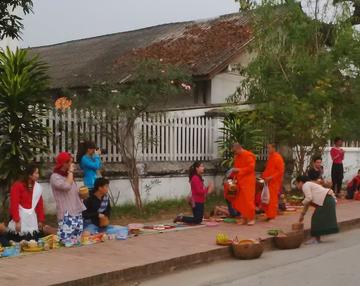The Anthropology of Buddhism
Convenor: Professor David Gellner

Early morning alms round in Luang Prabang, Laos, February 2015
Buddhism, of all the world religions, arguably comes closest to the ideal type of a soteriology or transcendent ideology; it offers a model of personal transformation and social relationships that is radically different from the Abrahamic religions. As such, it is arguably also South Asia’s most influential soft-power export. Its global influence and salience in the modern world, whether in South Asian, Tibetan, Southeast Asian, or East Asian forms, make it a highly relevant focus or way into an understanding of classical anthropological concerns, such as exchange, hierarchy, belief, ritual, migration, modernization, and globalization.
Take a look at…
Gellner, D.N. & R.F. Gombrich 2015. ‘Buddhism’ in J.D. Wright (ed.) International Encyclopedia of the Social & Behavioral Sciences (2nd ed.) Vol 2. Oxford: Elsevier.
Gombrich, R.F. 2006. Theravada Buddhism: A Social History from Ancient Benares to Modern Colombo. Routledge.
Gross, R.M. 2013. ‘Buddhism and Gender’, Oxford Bibliographies. DOI: 10.1093/obo/9780195393521-0146.
Harvey, P. 2013. An Introduction to Buddhism (2nd ed.). Cambridge: Univ. Press.